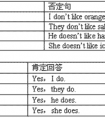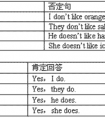改错。 ( ) 1.Winter,spring,summerandfallaremonths. _____________ A B C D( ) 2.Howacoldwindyday! _____________ A BC D( ) 3.WhatdoesJennylikedoinginwinter? __-六年级英语
- 不定式定义:
由to+动词原形构成。不定式是一种非限定性动词。而非限定动词是指那些在句中不能单独充当谓语的动词,可分为不定式,动名词,现在分词和过去分词。
“动词不定式”由动词+不定式构成。动词不定式在句中可以作句子除谓语之外的任何句子成分。动词不定式的被动形式除了一般形式外还有其完成式和进行式。
常见的有:like / love,want,need,ask,help等。
例:I like to play with Tom. 我喜欢和汤姆玩。
I want to play with Tom. 我想和汤姆玩。
I like to eat dumplings. 我喜欢吃饺子。 - 动词不定式一般结构:
疑问词who,what,which,when,where,whether,how后可接不定式构成不定式短语,在句中作主语、宾语、表 语等。如:
①When to leave for London has not been decided yet. (不定式在句子中做主语)
②Mr. Smith didn't know whether to leave or stay there. (不定式在句子中做宾语)
③I asked Professor Xu how to learn English well. (不定式在句子中做直接宾语)
④The question was where to get the medicine needed. (不定式在句子中表语)
以上例句中疑问词+不定式部分,均可转换为相应的从句形式。如:
①When we shall leave…
③…how I could learn…
经常在这种结构中使用的动词有:
consider,decide,discover,explain,find out,forget,hear,know,lea rn,observe,understand,wonder等。 - 动名词与不定式的区别:
1 动名词与不定式的区别:
动名词表达的是:状态,性质,心境,抽象,经常性,已发生的
不定式表达的是:目的,结果,原因,具体,一次性,将发生的
2 接不定式或动名词,意义相同。
3在下列情况下,一般要用不定式:
①hate,like,love前有would(should)时,
如:I'd like to have a cup of coffee.
②当谓语动词begin,continue,start等是进行式时,
如:Thestudents are starting to work on the di fficult maths problem.
③begin,continue,start与know,understand等状态动词连用时,
如:I soon began to understand what was happening.
④.advise,allow,encourage,forbid,permit等动词后接动名词作宾语,或带不定式作宾语补足语。如:
Our teachers don't permit our/us swimming in the lake.
Our teachers don't permit us to swim in the lake.
4 部分动词后接不定式或动名词时,意义差别较大,应根据句子语境选择使用。
forget,remember,regret后接不定式,表示现在或未来的动作,接动名词表示动作已经发生。如:
Don't forget to post the letter for me.
Have you forgotten meeting her in Beijing Airport?
Remember to close the windows before you leave.
I remember writing him a letter a year ago.
We regret to tell you that all of you are not invited toattend the meeting.
They regretted ordering these books from abroad. - 省to的动词不定式:
(1)情态动词( 除ought 外,ought to意思是“应该”,是情态动词,只有一种形式,后边接动词不定式,to不能省略。
ought to没有人称和数的变化,后接动词原形可以表示现在、将来或过去将来,由时间状语或上下文决定。例如:
They ought to come tomorrow.他们明天应当来):
(2)使役动词 let,have,make:
(3)感官动词see,watch,look at,notice,observe,hear,listen to,smell,feel,find 等后作宾补,省略to。
注意:在被动语态中则to 不能省掉。
在使役动词中get除外(get sb. to do sth.)
I saw him dance.
=He was seen to dance.
The boss made them work the whole night.
=They were made to work the whole night.
(4)表示个人意愿或倾向的would rather,had better,might(just) as well:rather than置于句首时。
Rather than ride on a crowded bus,he always prefers to ride a bike.
(5)Why… / why not…:
(6)help 可带to,也可不带to,help sb (to) do sth:
(7)but和except:but前是动词do时,后面出现的动词用不带to的动词不定式。
(8)由and,or和than连接的两个不定式,第二个to 可以省去:
(9)通常在discover,imagine,suppose,think,understand等词后,可以省去to be:
He is supposed (to be) nice. 他应该是个好人。
(10)but作介词,后接不定式结构时,前面谓语动词部分若含有do的形式时,but后的不定式要省去to,否则要带to。
He wants to do nothing but go out.
He wants to believe anything but to take the medicine.
(11)当两个或多个不定时短语由连词and,but或or连接时,后一个或几个不定式符号to常省略。但若表示对比、对照关系时,则不能省略。
He wants to move to France and marry the girl.
The purpose of new technologies is to make life easier,not to make it more difficult.
(12)不定式做表语时,一般要带to,但若主语部分中含有do的各种形式时,符号to可省去。
We've missed the last bus.All we could do now is walk home.
考点名称:实义动词
实义动词:
与系动词是相对的,系动词亦称连系动词,作为系动词,它本身有词义,但不能单独用作谓语,后边必须跟表语(亦称补语),构成系表结构说明主语的状况、性质、特征等情况。
实义动词意思完全,能独立用作谓语。
实义动词有及物动词和不及物动词(及物动词是指后面要求有直接宾语的动词;
不及物动词指后面不需要跟宾语的动词)即行为动词,表示动作的动词。
实义动词(又称行为动词):表示行为或状态,有完全的词义,能独立作谓语。
如:I go to school by bus. 我乘公交车去上学。
The students clean their classroom every day. 学生每天打扫教室。- 及物动词:
后面必须跟宾语,意义才完整的实义动词,叫做及物动词(transitive verb)。
英语中的及物动词有:interest,worry,guss,please,surprise,love等
例如:I believe that the committee will consider our suggestion.我相信委员会将会考虑我们的建议。
“How long can I keep the book ”Harry asked.哈里问:“这本书我可以借多久?”
Dr. Bethune set us a good example. 白求恩大夫给我们树立了好榜样。
Crude oil contains many useful substances.原油含有许多有用的物质。
不及物动词:
本身意义完整,后面不用跟宾语的实义动词,叫做不及物动词(intransitive verb)。
Birds fly.鸟会飞。
It happened in June 1932.这件事发生于一九三二年六月。
My watch stopped.我的表停了。
She spoke at the meeting yesterday evening. 她在昨天晚上的会上发了言。
兼作及物动词和不及物动词:
英语里有不少实义动词可以兼作及物动词和不及物动词。
这样的动词又有两种不同的情况:
a)兼作及物动词和不及物动词时,意义不变。试比较:
Shall I begin at once?我可以立刻开始吗?(begin作不及物动词)
She began working as a librarian after she left school.她毕业后当图书馆管理员。(began作及物动词)
When did they leave Chicago?他们是什么时候离开芝加哥的?(leave 作及物动词)
They left last week. 他们是上周离开的。(left 作不及物动词)
b)兼作及物动词和不及物动词时,有时意义不尽相同。如:
Wash your hands before meals.饭前要洗手。
Does this cloth wash well? 这布经得起洗吗?
与汉语的比较:
有时英语动词的及物和不及物的用法,与汉语的用法完全不一样,请注意下列两种情况:
a)有的动词在英语里只能用作不及物动词,而汉语则可用作及物动词,如arrive到达,agree同意,listen听。英语里这些动词后面常接介词。如:
We arrived at the railway station at noon.我们于中午到达火车站。(at不能省去)(比较:We reached the railway station at noon.)
Everybody listened to the lecture with great interest.每个人都很有兴趣地听讲课。(to不可省去)(比较:We all heard the lecture.)
Do they agree to the plan?他们同意这个计划吗?(to不可以省去)
b)有的动词在英语里能用作及物动词,而在汉语里则不能用作及物动词,如serve为…服务。
Our children are taught to serve the people wholeheartedly.我们的儿童被教以全心全意为人民服务 - 特殊实义动词:
英语动词很多既是及物动词又是不及物动词,如
close, begin, study, leave, work等。
①The post office closes at 9:00 p. m.邮局晚上9点关门。
②Close the window,please.请关窗。
③Shall we begin now?我们现在开始吗?
④ Bill began working as a sailor after he left school.比尔毕业后当水手。
⑤They left yesterday.他们昨天离开的。
- 最新内容
- 相关内容
- 网友推荐
- 图文推荐
上一篇:WewriteChristmas _________ toourfriends.[ ]A.cardB.cardsC.cardes-六年级英语
下一篇:选出正确的单词或词组填空。1.Mittensand__________(mitt,mitts)arethesame.2.Therearemany__________(peoples,people)attherestaurant.3.Heisagood__________(sing, s-六年级英语
零零教育社区:论坛热帖子
| [家长教育] 孩子为什么会和父母感情疏离? (2019-07-14) |
| [教师分享] 给远方姐姐的一封信 (2018-11-07) |
| [教师分享] 伸缩门 (2018-11-07) |
| [教师分享] 回家乡 (2018-11-07) |
| [教师分享] 是风味也是人间 (2018-11-07) |
| [教师分享] 一句格言的启示 (2018-11-07) |
| [教师分享] 无规矩不成方圆 (2018-11-07) |
| [教师分享] 第十届全国教育名家论坛有感(二) (2018-11-07) |
| [教师分享] 贪玩的小狗 (2018-11-07) |
| [教师分享] 未命名文章 (2018-11-07) |





![Therabbitlikes_________.[ ]A.bonesB.chickenC.fishD.vegetables-四年级英语](http://www.00-edu.com/d/file/ks/4/1/9/2019-08-12/small19d909f6c152d7dbd99050270d09dd701565564237.gif)
